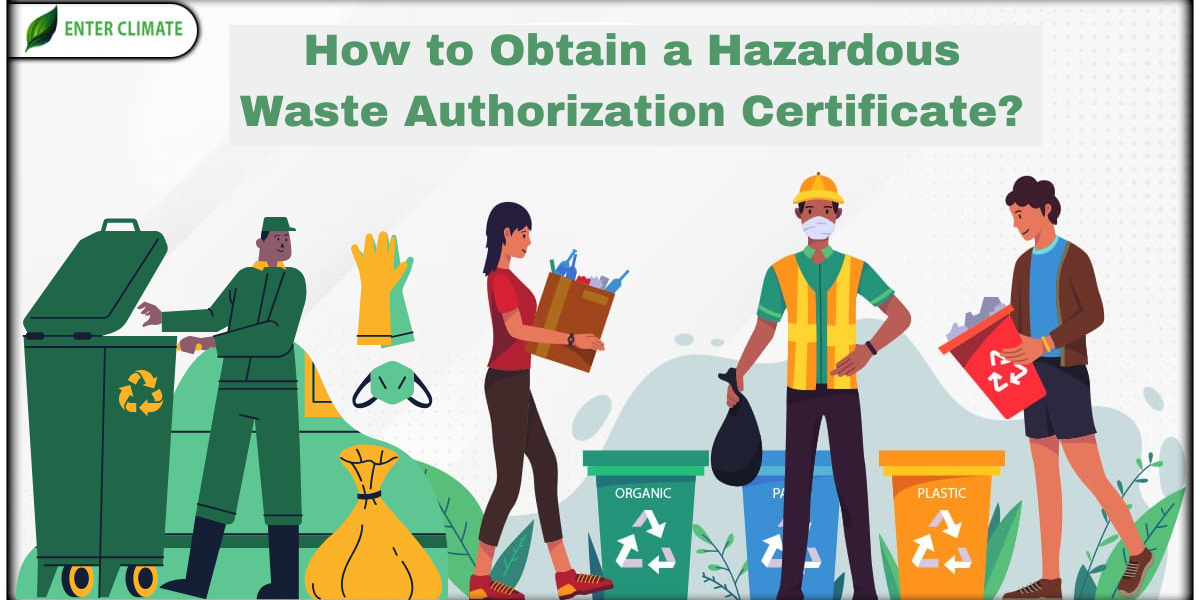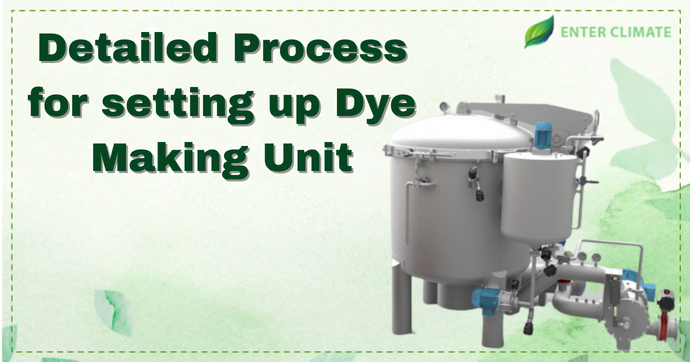How to Obtain a Hazardous Waste Authorization Certificate?
 31 Aug, 2023
31 Aug, 2023 
People’s lifestyles undergo significant shifts, so we often use various chemicals and products in our homes. However, we might not always realise that some substances can be corrosive, explosive, flammable, or toxic. These materials are classified as hazardous and must be separated from wet and dry waste streams from households, industries, etc. Incorrect disposal can pose health risks to us and harm the environment. Obtaining authorisation from the SPCB is the first and foremost step while starting to manage hazardous waste properly. The Hazardous Waste Authorization certificate is necessary for activities like generating, collecting, storing, transporting, treating, or disposing of hazardous and other listed wastes as per the Hazardous Wastes (Management and Transboundary Movement) Rules, 2016, including those mentioned in Schedules I, II, and Parts B & D of Schedule III.
What are Hazardous Waste Management Rules?
These regulations have been implemented to ensure the safe handling, creation, processing, storage, treatment, transportation, reprocessing, collection, and disposal of hazardous waste. The Hazardous Waste Management Rules were introduced in 1989 and subsequently updated in 2000 and 2003. Later, in 2016, the Hazardous Waste (Management, Handling, and Transboundary Movement) Rules were enacted.
These rules highlight the responsibility of private entities and governmental organisations involved in various activities related to hazardous waste, such as collecting, storing, packing, transporting, processing, recycling, recovering, pre and co-processing, transferring, or disposing of such waste.
Distinct rules are established for different categories of hazardous waste. Household hazardous waste falls within the scope of the Solid Waste Management Rules of 2016, while hazardous waste originating from industries and offices is separately addressed under the Hazardous Waste Rules of 2016. Some biomedical waste, though classified as domestic hazardous waste, is managed according to the Bio-medical Waste Management Rules of 2016, covering waste from healthcare establishments. Electronic waste, including items like computers, TVs, and fluorescent lights, is managed under specific e-waste management rules. The Battery Waste Management Rules, 2022, govern lead-acid batteries from home inverters and cars.
Who needs a Hazardous Waste Authorization Certificate?
It’s essential to recognise that anyone involved in activities related to hazardous and similar waste, such as handling, generating, collecting, storing, transporting, treating, packaging, processing, recycling, recovering, utilising, offering for sale, transferring, or disposing, needs approval from the state pollution control board.
- Industrial facilities that create, collect, receive, store, transport, treat, dispose of, or manage hazardous and other types of waste.
- Units, storage spaces, or warehouses where hazardous substances like pesticides, medicines, etc., are stored and where there’s regular production of contaminated, discarded, or substandard materials.
- Laboratories, vehicle service stations, and similar sites that store or use hazardous substances and produce hazardous waste, such as spent chemicals, solvents, contaminated filters or cloths, and chemical or oil-bearing residues.
- Facilities engaged in recycling or reprocessing hazardous and other wastes.
- Establishments offering services for collecting, receiving, storing, transporting, treating, or disposing of hazardous waste and biomedical waste.
Procedure for obtaining Hazardous Waste Management Authorization Certificate
Here is how the process of obtaining the authorisation works:
- Submission: Begin by applying, using Form I, to the state pollution control board. This application should be submitted within 60 days of these rules being published.
- Document Preparation: Ensure all required documents are correctly prepared and attached to the application. An authorised person should duly sign these documents. Alongside the application, you must include the “consent to establish” and “consent to operate” documents.
- Submission to State Pollution Board: Submit the completed application form and the necessary documents to the relevant state pollution control board.
- Review and Evaluation: The state pollution control board will review the application and accompanying documents. If the application is aligned with the requirements, they proceed to the next step.
- Authorisation Grant: If the board determines the application is suitable and meets the criteria, they will grant the necessary authorisation.
Documents required for Hazardous Waste Authorization certificate
When applying for a Hazardous Waste Authorization certificate, you will need to submit some important documents alongside the printed application. These include:
- A map showing the location and a layout plan of the site (like a plant layout).
- Information about handling and storing hazardous waste, including procedures and photos of your setup.
- Copies of your “Consent to Establish” certificate.
- If you already have it, a copy of your “Consent to Operate” certificate.
- If applicable, a copy of your agreement with a Common Hazardous Waste Treatment Storage Disposal Facility (CHWTSDF) or an Authorized Recycler / Reprocessor.
- If you renew your authorisation, provide a Compliance Report related to your previous approval.
As people’s lifestyles change significantly, we use various chemicals and products at home. Sometimes, we’re unaware these can be corrosive, explosive, flammable, or toxic. These substances are considered dangerous waste, and keeping them separate from regular wet and dry waste is important. Incorrect disposal can harm both our health and the environment[1]. To address this, proper management of hazardous waste is essential, and obtaining authorisation from the state pollution control board is a crucial step in this process.
Hazardous Waste Authorization Certificate granting Authorities
The HWM Rules have been formulated and are supported by SOPs for different sectors with a view to prevent accidents and minimise the negative impact of these materials on both people and the surroundings.
The following entities will need authorisation under the HWM Rules. Several authorities are involved in granting authorisation and overseeing the transboundary movement of Hazardous Waste. Each of these authorities plays a distinct role in ensuring that hazardous waste management activities are conducted in compliance with regulations and in a manner that safeguards human health and the environment.
- Central Pollution Control Board (CPCB): This central regulatory body coordinates and oversees various pollution control activities, including hazardous waste management, at the national level.
- State Pollution Control Board/Pollution Control Committee: These state-level bodies play a crucial role in implementing pollution control measures, including issuing hazardous waste management authorisation for legacy waste management, TSDF, CBMWTF and any kind of waste incinerators.
- Directorate General of Foreign Trade: This authority is involved in regulating foreign trade and implementing policies related to import and export. It may have a role in overseeing the cross-border movement of hazardous waste.
- Port Authority and Customs Authority: These authorities regulate the entry and exit of goods, including hazardous waste, through ports and borders. They ensure proper regulations and protocols needed to be followed during the transportation and transboundary movement of hazardous waste.
- Ministry of Environment, Forest, and Climate Change: This ministry is central in formulating and implementing environmental policies and regulations. It provides overarching guidance on matters related to hazardous waste management and its impact on the environment and climate.
Consequences of Improper Hazardous Waste Management
Hazardous waste poses a real threat to human well-being. Mishandling these materials can unleash harmful consequences on all living beings. Its impact can stretch across time, leaving enduring scars. Therefore, it’s imperative to implement proper management strategies to safeguard the environment and people.
The repercussions of improper hazardous waste management are dire. It can potentially escalate pollution levels and trigger damages of such magnitude that they might become irreversible without prompt intervention.
The detrimental effects of hazardous waste extend to the environment through soil contamination, water pollution, and the worsening of global warming. Particularly alarming is water pollution. Given water’s role as a potent solvent, it can easily harbour various chemicals. If toxic liquids mix with rainwater and flow into water bodies, it leads to water pollution. Envision the impact on animals and plants exposed to such polluted water. The toll on humans is equally concerning.
Furthermore, inadequate management of hazardous waste can contribute to global warming, which could significantly burden future generations. To avert this impending crisis, it is paramount that we effectively and responsibly manage all hazardous waste, preserving the planet for generations to come.
Conclusion
The Hazardous Waste Authorization certificate is pivotal in ensuring the responsible and safe management of hazardous waste. By adhering to regulations and obtaining this authorisation, organisations and individuals safeguard public health and the environment. This certificate underscores the commitment to proper handling, transportation, treatment, and disposal of hazardous waste, fostering a sustainable approach that balances industrial activities with ecological preservation. It is recommended to take expert advice for obtaining the Hazardous Waste Authorization certificate to ensure the documents that would be required for the grant of the certificate.
FAQs
The authorization for hazardous waste management is valid for 5 years. To renew this authorization, it’s important to submit a renewal application at least 120 days before the current authorization is set to expire.
The term “Authorisation” refers to the official permission granted for a range of activities involving hazardous wastes. This permission encompasses various actions such as generating, handling, collecting, receiving, treating, transporting, storing, reusing, recycling, recovering, pre-processing, utilizing (including co-processing), and ultimately disposing of hazardous wastes.
For initial applications, the Hazardous Waste Authorization (HWA) is issued for five years, starting from the date of application submission. This period allows for the assessment of the applicant’s status and compliance, which then helps in making informed decisions regarding the issuance of the Hazardous Waste Authorization.
During the transportation of hazardous wastes, the transporter is required to have the necessary documents, including the manifest, as specified in Rule 21 of the Hazardous Waste (Management, Handling, and Transboundary Movement) Rules. The trucks used for this transportation should be exclusively designated for carrying hazardous wastes and should not be utilized for any other purposes.
A TREM card, also referred to as a Transport Emergency Card, serves as a critical document during the transportation of hazardous materials. This card provides essential safety details about the cargo being transported in the vehicle.
The Uniform Hazardous Waste Manifest is a document that generators of hazardous waste must complete when they transport or make arrangements for transporting hazardous waste for off-site activities such as treatment, recycling, storage, or disposal.
Hazardous waste is predominantly transported via trucks on public roads. While a very limited quantity is transported by rail, almost none is moved through air or inland waterways. The preference for highway shipment is because road vehicles can easily reach most industrial facilities and approved Treatment, Storage, and Disposal Facilities (TSDFs).
Engaging in hazardous waste recycling isn’t just environmentally responsible; it can also have positive financial implications for an organization. Recycling hazardous waste has the potential to enhance production efficiency and lower expenses tied to procuring raw materials and managing waste.
It is crucial to store flammable, ignitable, reactive, and non-compatible wastes separately, avoiding any co-location within the same storage shed. b. The storage area can encompass various sheds designated for the storage of distinct types of incinerable hazardous wastes. These sheds should be appropriately designed with suitable openings.
The Hazardous Waste Management Rules have been introduced to guarantee the secure management of hazardous waste through practices that encompass safe handling, generation, processing, treatment, packaging, storage, transportation, utilization, reprocessing, collection, conversion, sales offerings, destruction, and final disposal of these hazardous materials.
Read our Article: Start your Hazardous Waste Management business and get your Authorisation with the Help of our Experts Easily.













